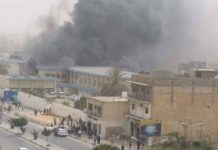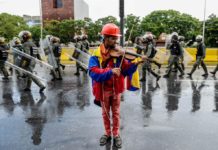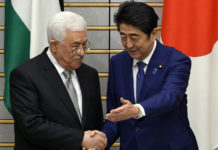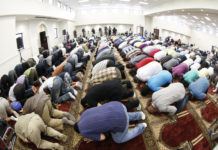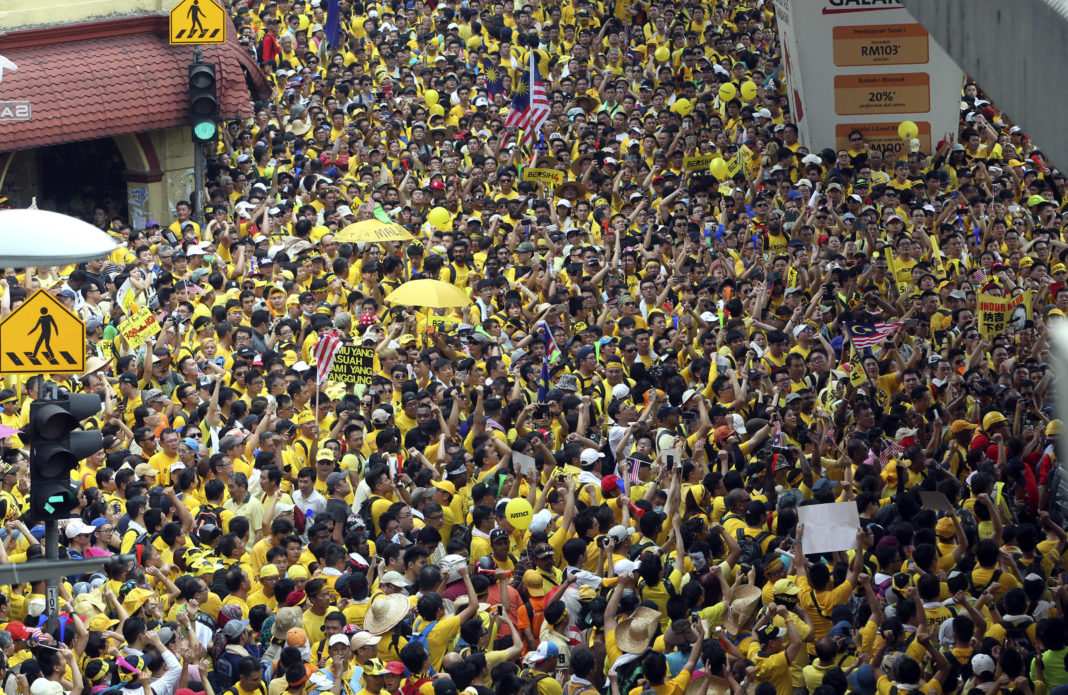Malaysia’s Bersih 5 rally: protesters weigh the cost of action under a repressive regime
Khoo Ying Hooi, University of Malaya
In Malaysia, democracy is a contested term in a political system marked by authoritarianism and rigged elections. But this hasn’t stop civil society from continuing to voice their demands.
A wave of mass protests organised by the Coalition for Clean and Fair Elections (Bersih) is calling attention to electoral politics both within Malaysia and internationally. An electoral reform movement that started out in 2005, initially known as the Joint Action Committee for Electoral Reform (JACER), Bersih is the most sustained protest movement in the nation’s history.
Tensions are now building as the fifth rally organised by group is expected to take place on November 19. This time around, there’s a significant counter-movement, known as Red Shirts, added into the mix. It’s led by Jamal Yunos, a politician who is the division chief of the Sungai Besar United Malays National Organization (UMNO).
UMNO is the largest political party in the ruling coalition, Barisan Nasional, governing alongside the Malaysian Chinese Association and Malaysian Indian Congress. Jamal has been quoted in news media as saying that his actions don’t represent the UMNO, and some party members have resisted being associated with him.
The Bersih movement and Red Shirts are both considered “illegal” by the government, as announced by the Malaysian Deputy Home Minister Ahmad Zahid Hamidi.
Jamal has been quoted in a local English-language newspaper, The Star, as saying:
I want to warn Bersih. Prepare yourself if you want to go against the decision of police and authorities. We too will go to the ground illegally just to oppose them… We are physically and mentally ready, and we are ready to face the consequences of our actions.
Foreign funds
In the meantime, the issue of foreign funding for Bersih and some other NGOs, including the local alternative online news portal Malaysiakini, is again being raised by the government.

Among the accusations levelled at the movement is the charge that groups are receiving foreign funds to try to topple the government.
This accusation is not new. In 2011, police investigations attempted to link Bersih with foreigners promoting pro-communist ideology, as reported by Utusan Malaysia.
In 2012, the mainstream English-language newspaper, News Straits Times, featured a special report alleging that NGOs including Bersih were trying to destabilise the government. The newspaper later apologised following the settlement of a defamation suit brought by the group. In the apology, the paper admitted it had no proof to substantiate the claims.
A history of rallies
Bersih has so far organised four rallies – in 2007, 2011, 2012 and 2015 – and each resulted in a different outcome. During the first rally on November 10 2007, organisers were subjected to various forms of police intimidation. They faced roadblocks and water canons. And the legality of the movement was questioned by the Home Affairs Ministry, as it was not registered with the Registrar of Societies.
This first Bersih rally was held prior to the nation’s general election in 2008. And it was arguably one of the reasons the ruling coalition did not garner a two-thirds majority in government, for the first time since 1969.
The second rally was held on July 9 2011. At that time, the political environment had changed and the run-up was tense. The police issued a long list of restrictions: entry to certain places was barred and 91 people, including opposition leaders and activists, were banned from entering the nation’s capital Kuala Lumpur.
Both police and the government were criticised by the local and international community for what demonstrators claimed was unwarranted heavy-handedness. A water cannon was fired into a hospital, and 1,667 demonstrators were arrested but then released without charge.
The government established the Parliamentary Select Committee on Electoral Reform in October 2011 as a result of the rally, to address fundamental electoral issues. The committee made 22 recommendations, which included the use of indelible ink on voters’ fingers to prevent them from voting twice. This was implemented in the 2013 general election.

Due to the lack for further significant electoral reform, the Bersih movement decided to organise another mass protest. This third rally was held on April 28 2012, and it was one of the largest such events ever held in Malaysia. There were significant tensions with the police and among the protesters themselves. Several violent incidents, such as the overturning of a police car, were reported.
Between the second and third rallies, the government introduced the Peaceful Assembly Act 2012 as a way to regulate public protests. The act came into effect only five days before the third rally.
The organisers held a fourth rally on 2015, in the aftermath of the general election in 2013, which was tainted by accusations of gerrymandering. The protest took place for two days from August 29 to 30.
State repression and citizen participation
Protests have the potential to cripple the political legitimacy of the state and very often, mobilisation strength by the citizenry is viewed as a threat to government.
Since Bersih launched its nationwide roadshow on October 1 2016 to garner support in more than 200 cities, the Red Shirts have been harassing its supporters. It’s important to find out how the state and authorities are involved in the movement and counter-movement dynamic, as the police have a role in facilitating the protests.
But what needs more attention right now is the growing level of state repression in controlling and monitoring citizens’ political behaviour. Despite the existence of the Peaceful Assembly Act 2012, which is meant to regulate public protests, there have been warnings issued by the police to the public about refraining from protesting.
While there are uncertainties about how Bersih and Red Shirts will interact during the mass rally planned for November 19, for now, it is crucial for the authorities to act impartially and carry out their duty of enabling an environment suitable for peaceful assembly.
Traditionally, the government of Malaysia tends to curtail movements that it deems dangerous, provocative and subversive. That means potential protesters need to think about the high cost of challenging a repressive state like Malaysia.
Holding onto power
At this juncture, Malaysia is probably best considered as a relatively stable, semi-authoritarian regime. This explains why, despite public frustration and grievances about government policies and the leadership of Prime Minister Najib Razak, the regime continues to hold on to power.

As protests organised by Bersih have grown in size over the past decade, the level of fear among Malaysian citizens may have fallen. But just because fear is falling, doesn’t mean state repression doesn’t still exist.
A key question now is whether Bersih will still be able to attract crowds. Given former prime minister Mahathir Mohamad has announced his support for the rally (he also attended the 2015 protest), can organisers expect a good turnout this time, despite the fear generated by state repression and the threat posed by Red Shirts?
In view of growing state repression, the cost of participation could be greater than its benefits. In a growing repressive regime such as Malaysia, the tendency to let others incur the high costs of protest is especially strong. As a result, one thing we might anticipate at this fifth Bersih rally is the free-rider problem, where people might think that one more participant won’t make a great difference to the likelihood of success.
The key determinant of the success of the fifth Bersih rally, then, depends on the decision citizens make when weighing the costs and benefits of having their voices heard.
Khoo Ying Hooi, Senior Lecturer in International Relations, University of Malaya
This article was originally published on The Conversation. Read the original article.
